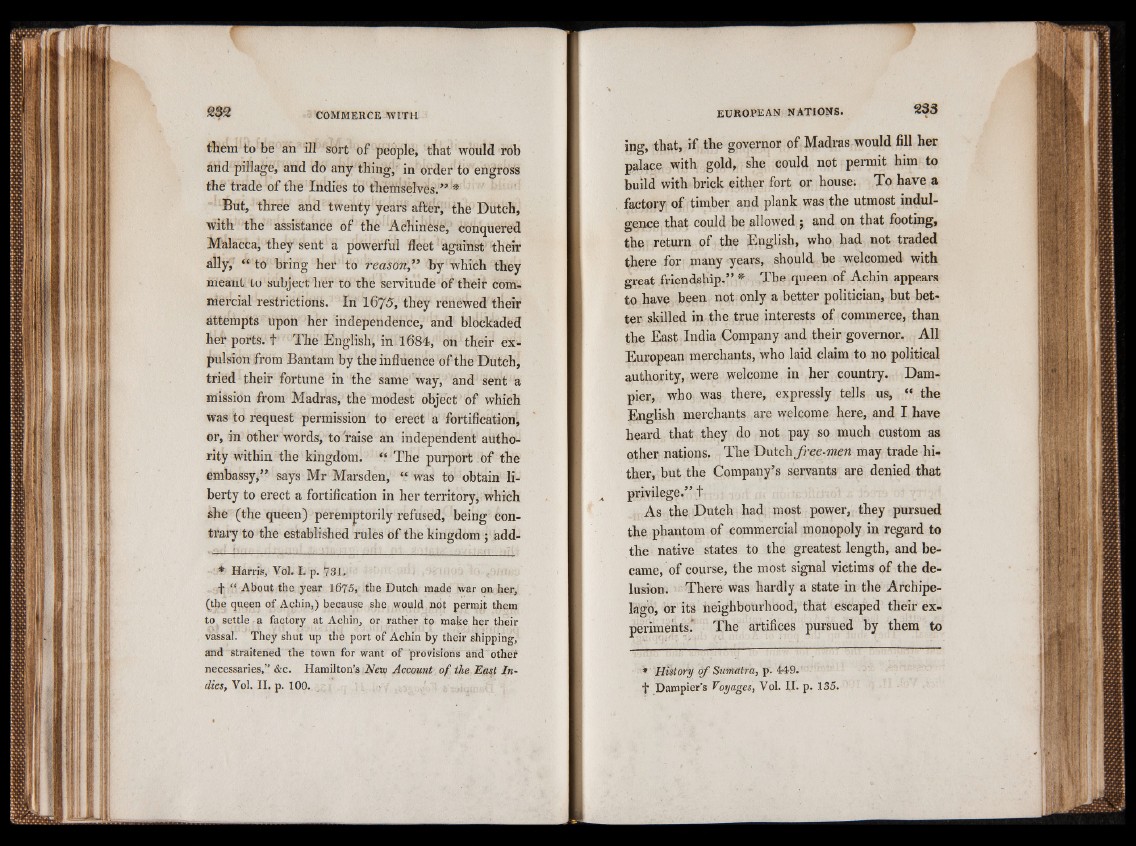
them to be an ill sort of people, that would rob
and pillage, and do any thing, in order to engross
the trade of the Indies to themselves.” *
But, three and twenty years after, the Dutch,
with the assistance of the A Chinese, conquered
Malacca, they sent a powerful fleet against their
ally,: “ to bring her to reason,” by which they
meant to subject her to the servitude of their commercial
restrictions. In 1675, they renewed their
attempts upon her independence, and blockaded
her ports. + The English, in 1684, on their expulsion
from Bantam by the influence of the Dutch,
tried their fortune in the same way, and sent a
mission from Madras, the modest object of which
was to request permission to erect a fortification^
or, in other words, to raise an independent authority
within the kingdom. “ The purport of the
embassy,” says Mr Marsden, “ was to obtain liberty
to erect a fortification in her territory, which
she (the queen) peremptorily refused, being contrary
to the established rules of the kingdom j add-
* Harris, Vol. I. p. *131.
f ‘‘ About the year 1675, the Dutch made war on her,
(the queen of Achin,) because she would not permit them
to settle a factory at Achin, or rather to make her their
vassal. They shut up the port of Achin by their shipping,
and straitened the town for want of provisions and othei
necessaries,” &c. Hamilton’s New Account o f the East Indies>
Vol. II. p. 100.
ing, that, if the governor of Madras would fill her
palace with gold, she could not permit him to
build with brick either fort or house; To have a
factory of timber and plank was the utmost indulgence
that could be allowed : and on that footing,
the return of the English, who had not traded
there for many years, should be welcomed with
great friendship.” * The queen of Achin appears
to have been not only a better politician, but better
skilled in the true interests of commerce, than
the East India Company and their governor. All
European merchants, who laid claim to no political
authority, were welcome in her country. Dam-
pier, who was there, expressly tells us, “ the
English merchants are welcome here, and I have
heard that they do not pay so much custom as
other nations. The Thatch, free-men may trade hither,
but the Company’s servants are denied that
privilege.” t
As the Dutch had most power, they pursued
the phantom of commercial monopoly in regard to
the native states to the greatest length, and became,
of course, the most signal victims of the delusion.
There was hardly a state in the Archipelago,
or its neighbourhood, that escaped their experiments.’
The artifices pursued by them to
* History of Sumatra, p. 449.
t Dampier’s Voyages, Vol. II. p. 135.